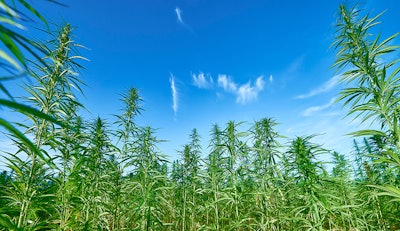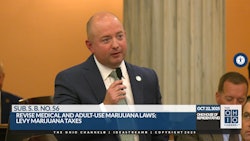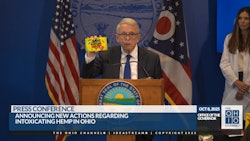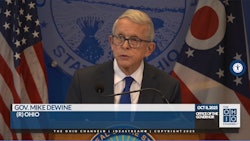
The chief law officers from 37 states and two U.S. territories sent a letter Oct. 24 to U.S. House and Senate committee leaders, asking them to stop “dangerous and intoxicating” hemp-derived THC products from being sold and manufactured.
The bipartisan coalition of 39 attorneys general, including those from Puerto Rico and the U.S. Virgin Islands, asked that Congress redefine hemp to close what many have termed an unintended “loophole” in the 2018 Farm Bill, which federally legalized the commercial cultivation of hemp.
Arkansas Attorney General Tim Griffin, along with his counterparts from Indiana (Todd Rokita), Connecticut (William Tong) and Minnesota (Keith Ellison), spearheaded the letter that they signed with other members of the National Association of Attorneys General (NAAG).
“Since the passage of the 2018 Farm Bill, hemp-derived THC products – often more potent than marijuana – have flooded the market due to a misinterpretation of the bill’s language,” Griffin said in a separate press release. “These synthetic cannabinoids, including delta-8, delta-10, THC-O, and others, are being sold in gas stations, convenience stores and online retailers across the country, frequently in packaging purposefully designed to appeal to children.”
The attorneys general sent the letter to the Appropriations and Agriculture committee chairs in both the Senate and House, including Sen. Susan Collins, R-Maine; Sen. John Boozman, R-Ark.; Rep. Tom Cole, R-Okla.; and Rep. Glenn “GT” Thompson, R-Pa.
The letter signers asked the congressional leaders to clarify the definition of hemp through the fiscal 2026 appropriations process or through the farm bill’s pending reauthorization to “leave no doubt that these harmful products are illegal.” The letter signers asked that Congress criminalize the sale and manufacture of intoxicating hemp products.
“Intoxicating hemp-derived THC products have inundated communities throughout our states due to a grievously mistaken interpretation of the 2018 Farm Bill’s definition of ‘hemp’ that companies are leveraging to pursue profits at the expense of public safety and health,” the attorneys general wrote. “Many of these products – created by manufacturers by manipulating hemp to produce synthetic THC – are more intoxicating and psychoactive than marijuana, a Schedule I controlled substance, and are often marketed to minors. Unless Congress acts, this gross distortion of the 2018 Farm Bill’s hemp provision will continue to fuel the rapid growth of an underregulated industry that threatens public health and safety and undermines law enforcement nationwide.”
In addition to the abovementioned states and territories, the letter was also signed by attorneys general from Alabama, Arizona, California, Colorado, Delaware, Georgia, Hawaii, Illinois, Iowa, Kansas, Louisiana, Maine, Maryland, Massachusetts, Mississippi, Missouri, Nebraska, Nevada, New Hampshire, New Mexico, New York, North Carolina, North Dakota, Ohio, Oklahoma, Pennsylvania, Rhode Island, South Carolina, South Dakota, Utah, Vermont, Virginia and Wyoming.
Sen. Mitch McConnell, R-Ky., who championed the federal legalization of commercial hemp cultivation in 2018 as a pathway for Kentucky’s struggling tobacco farmers to benefit from a new agricultural commodity, said in July that he had never intended for the farm bill to “open the door to the sale of unregulated, intoxicating, lab-made, hemp-derived substances with no safety framework.”
That admission came as 27 Senate Appropriations Committee members voted unanimously to approve a 136-page spending bill that included language to ban hemp-derived products containing synthetic compounds and/or quantifiable amounts of THC or THCA, or other cannabinoids that have similar effects on humans or animals. McConnell termed the language as a legislative fix to align with the original intent of the 2018 Farm Bill.
However, Sen. John Hoeven, R-N.D., who chairs the Appropriations Agriculture-Food and Drug Administration (FDA) subcommittee, notified reporters later in July that the hemp THC product language was struck by a manager’s amendment before final passage. The language was pulled because Sen. Rand Paul, R-Ky., threatened to block the entire legislation, which includes more than $27 billion in discretionary funding to support farmers, rural communities and nutrition programs, if the hemp language wasn’t stricken.
Paul, who supports regulation over prohibition, said in September 2024 that he hopes to protect the legalized hemp industry by preventing the federal government “from weighing down our farmers with unnecessary bureaucratic micromanaging.”
As many states have already implemented laws to regulate or ban consumable products containing hemp derivatives, many believe Paul’s pushback at the federal level has only delayed the inevitable. A finalized agriculture spending bill has yet to pass Congress.
“Congress never meant to legalize these products in the 2018 Farm Bill,” the 39 attorneys general wrote. “A proper interpretation of the farm bill’s hemp provision demonstrates that the entire synthetic THC industry rests on a foundation of illicit conduct. Clear direction from Congress is needed to shut down this industry before it metastasizes further into an even greater threat to public safety than it already is.”
While the bipartisan coalition said that the 2018 Farm Bill intended to provide an industrial hemp commodity for the fiber and grain markets, the legislation’s 0.3% delta-9 THC on a dry-weight basis definition established an inadvertent ambiguity that has allowed “bad actors” to exploit the American public with “dangerous drugs” through highly advanced chemical processes.
The attorneys general pointed to the often-used chemical process of converting nonintoxicating CBD from the hemp plant into intoxicating delta-8 THC. The letter writers also pointed to laboratory-created or altered compounds like delta-10 THC, THC-O, THCP and HHC, which are then infused “at high concentrations into a multitude of products that can intoxicate a person as severely as the most potent strains of cannabis sold on the illicit market.”
“In other words,” the attorneys general wrote, “industry actors have nefariously misinterpreted the farm bill’s legalization of low concentrations of hemp-derived delta-9 and the bill’s silence regarding hemp-derived THC products other than delta-9 to claim that the farm bill allows them to produce and sell various synthetic cannabinoids regardless of the chemicals’ potency and psychoactive effects.”
The attorneys general said these “Frankenstein THC” products play by their own set of rules – including age restrictions, labeling standards and testing requirements – and have led to “stark and severe” public health consequences.
In Indiana, where medical and adult-use cannabis programs remain prohibited, total cannabinoid and analog exposures reported to poison control centers increased 41% between 2022 and 2024, with pediatric exposures under age 5 rising 46% and exposures among children aged 6–12 increasing 62%, according to the state’s Department of Health.
Indiana Attorney General Todd Rokita was among the four signers who spearheaded the letter.
State-level efforts to rein in the hemp-derived cannabinoid product marketplace are not enough, according to the bipartisan coalition.
“Such efforts can only lead to an uneven and ineffectual patchwork of bans and regulations that differ from state to state and will not stop the flood of mail-order THC products from streaming through interstate commerce,” they wrote. “Congress must act to salvage the 2018 Farm Bill’s laudable legalization of commercial hemp from the psychoactive hemp industry’s spoliation of the bill’s hemp provision.”

























